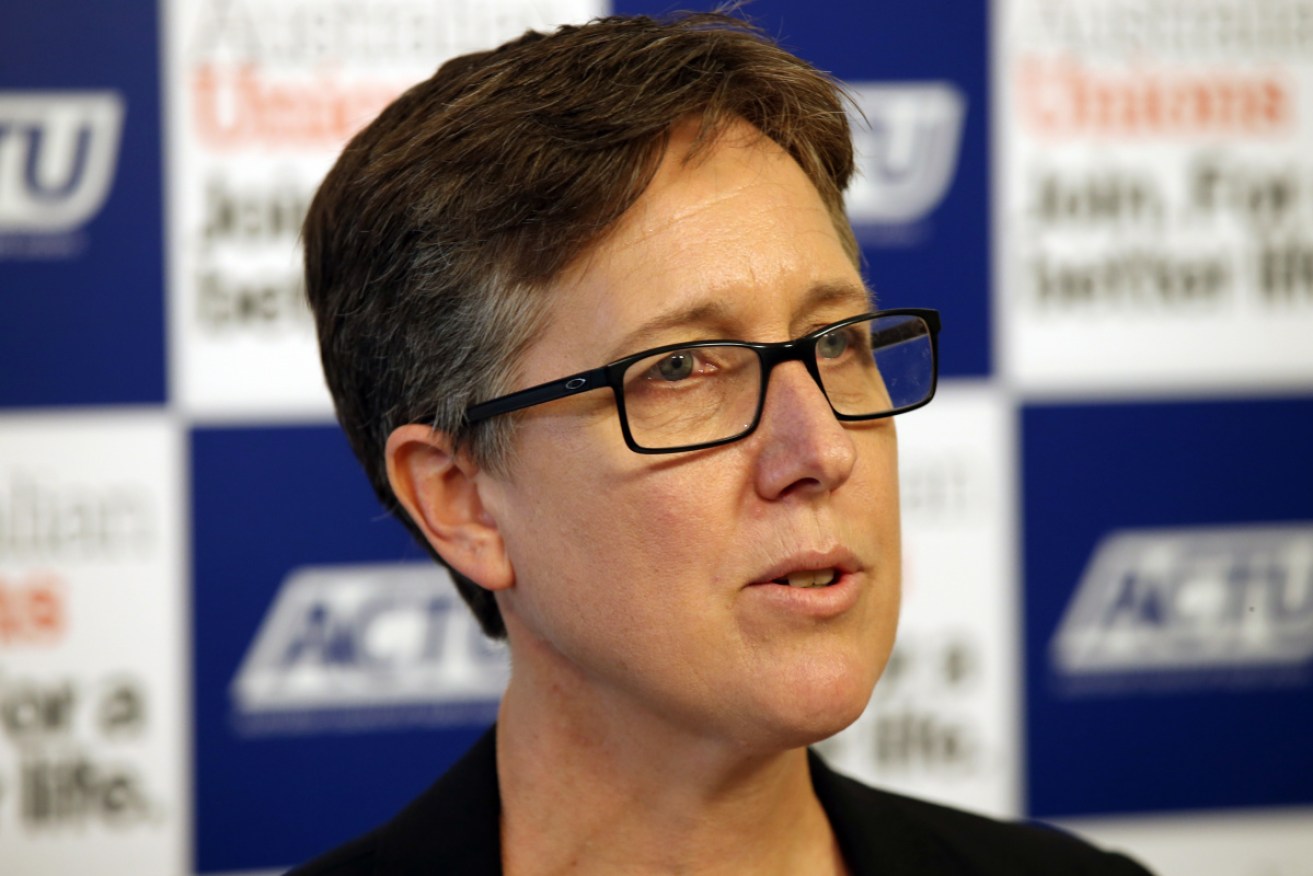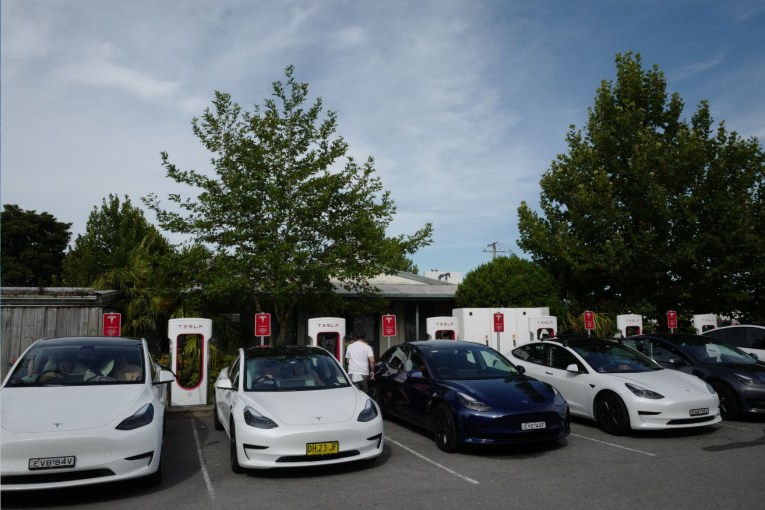Sally McManus on Australia’s coronavirus response, and the road to recovery


ACTU secretary Sally McManus says small firms are missing out under the industrial relations system. Photo: AAP
It was just last May that Prime Minister Scott Morrison threatened that Australian Council of Trade Unions secretary Sally McManus would be sitting “on every board in this country” if Labor won the election.
Fast-forward less than a year and the Morrison government has laid its ideological differences with the union movement to one side as the nation battles twin health and economic crises caused by a once-in-a-century pandemic.
“There are no more unions or bosses. There are just Australians now. That’s all that matters,” Mr Morrison declared earlier this month.
The working relationship between unions and the federal government has strengthened to such an extent that Ms McManus now speaks daily via video conference and WhatsApp with long-time foe, Industrial Relations Minister Christian Porter.
‘The odd couple truce working to save jobs’, read one headline in The Australian in March.
“If you told me I was going to be BFF with Sally McManus three weeks ago, I wouldn’t have believed you,” Mr Porter told the publication.

Scott Morrison and Christian Porter have praised their long-time foe. Photo: AAP
It’s this thawing relationship that has been key to saving jobs and protecting workers during the coronavirus pandemic, Ms McManus told The New Daily.
“Good decisions started to be made when [the federal government] set up a national cabinet, and that was around the same time they started formally consulting with unions,” she said.
“That has meant that they’ve had input or heard different voices that have had different perspectives on what to do and what was actually happening out there … that they’ve made better decisions.”
Ms McManus is unsure whether the spirit of co-operation will survive once the crisis is over.
“I don’t know. But I can say that we understand each other better,” she said.
“And we hope that as a result of working together during this crisis when it has been high stakes that the government stops their ideological agenda against unions and treats us with respect.
“They may not like everything we say all the time. But the fact is it’s really important to have a voice for working people in our country.”
‘Hundreds of thousands’ of jobs saved
Australia is “likely to experience the biggest contraction in national output and income that we have witnessed since the 1930s” over the first half of 2020, Reserve Bank of Australia governor Philip Lowe said on Tuesday.
Australia’s unemployment rate is tipped to hit double figures by June, and will likely remain above 6 per cent “for the next couple of years”, Dr Lowe said.
But things could have been much worse.
“The unemployment rate would have been much higher than this without the government’s JobKeeper wage subsidy,” Dr Lowe said.
Ms McManus was among the loudest voices calling for a wage subsidy to be introduced, and for JobKeeper be extended to cover casuals.
Unions initially predicted the unemployment rate to soar above 15 per cent, and “the reason that’s different is because of JobKeeper,” she said.
I think that’s going to save literally hundreds and thousands of jobs, and probably reduce the unemployment rate by at least 5 per cent, if not more.’’
But the government could have prevented more job losses if they had acted earlier, Ms McManus said.
“Unfortunately, the [initial] lack of a wage subsidy did lead to an enormous amount of job shedding until the [JobKeeper] announcement a week later,” she said.
If they had have listened to us earlier, better decisions would have been made. But in the end, those decisions have been good ones.’’
Government must ‘lead the way’, fund public works
The government must bankroll nationwide public works if Australia’s economy is to recover from the coronavirus shutdown, Ms McManus said.
“Just like in other times where we have had really serious depressions or recessions, the government has really got to lead the way,” she said.
“They’re the ones that are going to need to commit to a pipeline of work.
It has been 10 years since those school halls got built. It’s probably time for them to be painted.’’
Funding public works, “as was done out of the Great Depression, and as we did as successfully out of the GFC” is the only way to keep people in employment and create jobs, Ms McManus said.

The Sydney Harbour Bridge is a Great Depression-era public works project. Photo: National Museum of Australia
“At this point I think there’s no choice for the government other than to do that,” she said.
There’s actually no other way of stimulating the domestic economy.’’
If Australia manages to “eliminate the virus, or at least seriously suppress it and keep it under control”, the nation could “emerge from this in a lot of industries a lot quicker, which would be a very good thing”, Ms McManus said.
“It’s hard to predict exactly where that will go. At the moment it looks very optimistic.”
However, with international borders remaining closed for the foreseeable future, major industries including aviation and tourism will be hit hard.
“So we’re going to continue to see a downturn that will mean that we need to think about our domestic economy and be doing everything we can to grow rapidly in our domestic economy,” Ms McManus said.
We’re going to need people that are back in work to spend, and we’re going to need them to spend a lot of it, or all of it, locally.’’
‘Snap back’? A post-pandemic Australia
Leaders are already charting pathways out of the crisis, but what Australia will look like post-pandemic remains to be seen.
Mr Morrison’s plan is for Australia’s economy to go into “hibernation” during the coronavirus shutdown, and “snap back” to the way it was once the threat is over.
But not everyone is content with a simple return to the status quo.
The coronavirus pandemic has “laid bare our crisis of insecure work”, Ms McManus said.
“The fact that the government can’t design a policy to cover all forms of insecure work just really says it all,” she said.

The coronavirus has ‘”laid bare our crisis of insecure work”, Sally McManus says. Photo: AAP
“We’ve let that get out of control in our country.
“It’s not right that you have two groups of workers – one that have a full set of rights, another group that don’t.
“That’s the case for one in three people.”
The pandemic has also exposed the “blind globalism” that saw Australian manufacturing jobs go overseas, Ms McManus said.
“We’ve said we can’t compete with some countries to our north. Well, that has just left us incredibly vulnerable [and lacking] essential things during a crisis,” she said.
Australia should realise “the value of having skilled labour and having a manufacturing industry” to tackle future challenges, Ms McManus said.
“We could become more self-reliant and also have skillsets that will serve our country into the future when we’ve got to respond to other challenges like climate change,” she said.
The New Daily is owned by Industry Super Holdings







